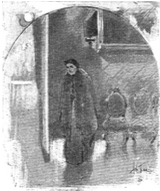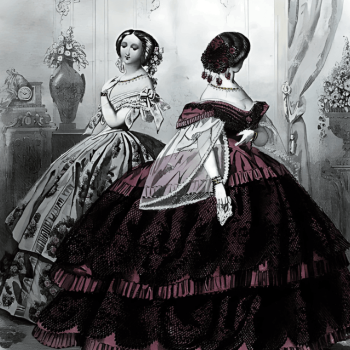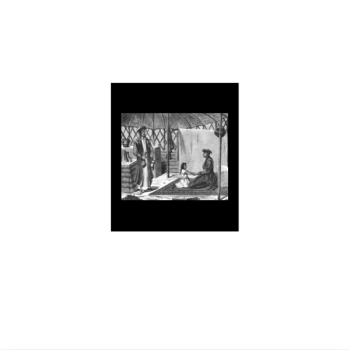YOLKA
January 1841
Vera was left speechless with amazed delight when, after sitting alone upstairs in the nursery all day, she saw it from afar, from the corridor, in the middle of the hall all flooded with light! The Christmas tree was beautiful, richly adorned with all sorts of sweets, and decorated with garlands of greenery and flowers (skillfully made by Baba Lena from colored paper and calico.) It was a new tradition introduced to Russia by the Tsarina Alexandra Feodorovna who (before her marriage to Tsar Nicholas Pavlovich in 1817,) was Princess Charlotte of Prussia.[1] All the children found many beautiful toys under it—but there were gifts for everyone, adult relatives, acquaintances, and servants. In addition to the candles burning on the tree, the long table was surrounded it was like a ring of fire. It was all covered with plates of delicacies for the courtyard people and their children, and in each, among the sweets, a lit candle was placed. The older servants, all the women and girl maids stood in the hall itself; the rest were in the hallway. Yes, everyone received gifts for the holidays. Baba Lena always said that: “It is a bad thing if all the servants do not share the lordly fun.” It was for this reason that people loved her, as, perhaps, few gentlemen in the world have ever been loved.
A few days later, Vera was sitting with Baba Lena in the sofa room when she was informed that the merchant Gorov had arrived and wanted to see her. Baba Lena ordered him to be accepted and went out to him into the living room, where, of course, Vera slipped in after her. It turned out that Gorov had come to ask them all to come to his Christmas tree. He bowed intensely to Baba Lena and asked that she herself, and for all the ladies of her family, to “do him the honor” of attending. As for Dede Andrushka, he said that he “doesn’t dare ask him.”
Vera was very surprised by such talk. It seemed to her that Gorov wanted to please them—but what kind of honor that would give him, she positively did not understand. She understood even less why he said that about Dede Andrushka. Why did he invite them, but dare not ask Dede Andrushka? Vera soon forgot about it but was destined to be surprised by many more things the following day when they were at the Gorovs’ home.
At six o’clock in the evening, their cart stopped at a larger stone house. They began to get out to the entrance but had some difficulty untangling their feet in the warm “boots” they made of fur coats. They were eventually untangled by their agile footman, Pyotr, who was the brother of Maxim, the cook.[2] Lelya deftly jumped out, passing through Pyotr’s hands. Vera really wanted to follow Lelya’s example, but Pyotr unceremoniously grabbed her with one hand, and slammed the door with the other, shouting to the coachman: “Drive away!” He then carried her along the brightly lit stairs, right up to the front hall, where the hostess and her daughters were helping Baba Lena, Helena Andreyevna, Aunt Katya, and Aunt Nadya undress. Vera knew Gorov’s daughters, especially the eldest girl, lame Masha. They had a dacha not far from theirs, and they once had breakfast with them, but tonight was the first time she saw the face of his wife. She wore a colorful dress of blue velvet mantilla, earrings, many rings, but most striking of all was her very black teeth. They were so striking, in fact, that Vera completely forgot to get off the bench on which Pyotr undressed her. Masha reminded her of this by kissing her.

Gurov’s Mother.[3]
“Hello, Verochka!” said Masha, helping her off to the floor. “Let’s go to the hall.”
Everyone except Baba Lena had already entered there. Vera’s attention was again stopped at the door by some old woman, in a dark dress, with a black silk scarf tied up to her forehead, like Nanny Nastya’s. Calmly, but coldly, without fussing and without any smiles, she looked at the guests from under her brows and greeted everyone with a low bow.
“May I introduce you to my mother, Your Excellency!” Gorov said to Baba Lena.
“I know your mother well,” said Baba Lena, affably, stopping next to the old woman who was silently bowing to her. “I see her often in the hospital and almshouse.” Baba Lena then addressed the old mother. “We met recently, I believe, on the first day holiday, when you brought white bread and pies to the almshouse, no?”
“Exactly so, Your Excellency,” Gorov answered with a satisfied smile. “It’s always like this, every holiday mother brings wheat rolls and beef pies to the almshouse and to the prison too. This is a custom we inherited from our great-grandfathers. My mother told me that they often meet you there, but I thought that you did not deign to notice them.”
“Even if I hadn’t noticed her, I couldn’t help but hear about your mother—indeed, the whole city knows about her good deeds.”
Vera held Baba Lena’s hand, deliberately lagging behind everyone, and listened attentively. She was surprised by the serious, almost stern expression on old lady Gorovaya’s face. She did not answer Baba Lena, but only, continuing to bow, said, without even raising her eyes, but pointing to the hall: “Please welcome.” Gorov, however, talked a lot, and cheerfully. Occasionally, while stroking his beard with great pleasure, a large round medal could be seen on the red ribbon around his neck.
In the large room, which Gorov owners called the “hall” (although the crimson furniture in it was the same as in the living rooms,) they found many acquaintances. The Beketov sisters were there, but Vera disliked them because they refused to play with her and Grunya Zaitseva, calling her “cette petite servant.”[4] Varya and Olya Likhachev were there, and plump Katya Polyanskaya, and many more girls and boys with their relatives and governesses. They barely had time to say hello to everyone when the door opened to another room, from which music was heard.
“Come to the organ room,” said Gorov, beckoning his guests into a shining white hall. It was flooded with the light of candelabra, chandeliers, and hundreds of wax candles burning on the Christmas tree in the middle of the room. It was a magnificent tree, so thickly hung that its branches bent under the weight of sweets and decorations. There were lovely bonbonnieres, boxes, toys, figurines, and shiny multi-colored garlands and chains made of candies and gold and silver balls. There were various fruits (apples, pears, oranges, plums, and peaches,) beautifully made from sugar, and a huge gingerbread house, which stood at the very top of the tree. It was decorated with foil instead of windows, with chocolate doors and almond handles. The eyes of the children ran wide at all this splendor.
A beautiful, expensive organ, all the while, played in the choir at the back of the hall. It was a large barrel organ wound up with a key, and that was why Gorov called this room the “organ room.” Gorov took Vera, Lelya, and Aunt Nadya to the tree, and began to treat them earnestly.
“Pick whatever you want from the tree,” he insisted.
The girls, of course, refused.
Then Masha and her sisters armed themselves with scissors and began to cut off all the pretty little things and sweets for themselves, constantly asking the children to indicate what they liked. Their black-toothed hostess kept smiling and bowing, treating everyone to fruits and preserves with which the entire table was covered. She took the girls by the hands and, leading them to a variety of pretty bonbonnieres, asked them to choose whatever they wanted.
Embarrassed, Aunt Nadya made excuses but was finally forced to take the first box she came across. Lelya and Vera were more accommodating and chose the prettiest ones. Lelya picked a basket of flowers, and Vera picked a hilarious monkey with sparkling eyes, who turned its head and clapped the tambourine when the box was opened. (They also gave her a box of sweets and a gingerbread house.)
On the way back, Baba Lena voiced her dissatisfaction with Gorov’s “stupid Christmas tree.”
Helena Andreyevna and Aunt Katya laughed, calming Baba Lena down.
“It is impossible to offend Gorov,” they said. “Don’t be upset with him or the children because of these ‘imposed’ gifts.
“Well,” said Aunt Nadya, “I was terribly annoyed when they pestered me with this bonbonniere and their treats! Especially when they treated me to jams, which everyone had to eat from one spoon.”
“Well, you cannot blame him for that,” said Baba Lena. “That’s just the way that merchants do. Nevertheless, it was very unpleasant knowing that he spent so much money to treat us. This is just foolish!”
“Why is it stupid, Baba Lena?” Vera intervened. “He is kind! I had a lot of fun.”
“Well, thank God that you at least had fun,” laughed Baba Lena.
“I didn’t have fun at all!” Lelya announced importantly. It’s all so bourgeois. The Beketovs also said that they were bored. We kept laughing at that lame woman—”
“Lelya!” shouted Helena Andreyevna, interrupting her. “That is very shameful to laugh at someone’s natural defect. It’s sinful and shows an evil heart!”
“Don’t believe her, Mamochka—Lelya is making this up! She had a lot of fun, but she only says that to be equal to the grownups.”
“Then she speaks in vain,” said Baba Lena.
Everyone laughed. Lelya got very angry with Vera, but not for long.
Lelya had a strange excitability of temperament. There was no question about that. No one disputed that she was liable to ungovernable fits of passion, nor denied that she possessed a deep-rooted disposition to rebel against every kind of authority or control. Nevertheless, everyone recognized that Lelya had genuinely warm-hearted impulses of kindliness and affection. Such actions, and her clever humor, endeared her to her relatives and obliterated the irritation caused by her lack of self-control regarding the minor affairs of life. Lelya never remembered evil, indeed, she had no malice in her nature, nor the capacity for lasting resentment (even against those who wronged her.) Her true kindness of heart bore no permanent traces of momentary disturbances.[5] Lelya, in short, was generally very kind, although she and Vera often quarreled, as almost happened the next day after the Gorov’s Christmas tree.[6]
-
- MOTHERS & DAUGHTERS
- A LANTERN
- CHRISTENING OF THE DOLL
- DASHA & DUNYA
- GRUNYA
- NANNY NASTYA
- NANNY’S FAIRYTALE
- CONFESSION
- IN THE MONASTERY
- PREPARATIONS FOR THE HOLIDAY
- EASTER
- THE DACHA
- THE MELON POND
- MIKHAIL IVANOVICH
- THE WARLIKE PARTRIDGE
- LEONID
- NEW WINTER
- HISTORY OF BELYANKA
- THEATRES AND BALLS
- YOLKA
- REASONING
- ROAD
- CAMP
- IN NEW PLACES
- THE GRAY MONK
- VARENIKI
- THE TRIP TO DIKANKA
- WHAT HAPPENED IN THE DOLL HOUSE
- ANTONIA’S STORY
- “A WINTER EVENING”
- THE BLACK SEA
- CRIME AND PUNISHMENT
- PANIKHIDA
- PRINCE TYUMEN
SOURCES:
[1] August Theodor von Grimm writes: “The feast of Christmas is, in Germany, the greatest of all, celebrated by special social and kindly family meetings, as well as the holy Christmas Eve, when both children and the poor are provided with gifts; but the festival passes very quietly in Russia, where Easter is considered a much greater church and national commemoration. Alexandra resolved to light up a home Christmas tree in her little circle; its charm, however, was not then so well understood as in after years, when merry children played round it; she never gave up this German custom, and in succeeding years the Christmas tree became as familiar in Petersburg as in German towns, and also Christmas displays just as with [Germany.]” [von Grimm, August Theodor. Alexandra Feodorowna, Empress of Russia: Vol. I. Edmonston And Douglas. Edinburgh, Scotland. (1870) 114.]
[2] Zhelihovskaya, Vera Petrovna; (ed.) Deveney, John Patrick. “The Truth About H.P. Blavatsky.” The Newsletter Of The Friends Of The Theosophical Archives. Special Edition. (Summer 2015): 1-100. [Pages: 53-54.]
[3] Zhelihovskaya, Vera Petrovna. How I Was Little. A. F. Devrien. St. Petersburg, Russia. (1898): 156.
[4] [Fr. “This little slave.”]
[5] Sinnett, Alfred Percy. The Letters Of H. P. Blavatsky To A. P. Sinnett And Other Miscellaneous Letters. T. Fisher Unwin Ltd. London, England. (1925): 25-26.
[6] Zhelihovskaya, Vera Petrovna. How I Was Little. A. F. Devrien. St. Petersburg, Russia. (1898): 153-161.













